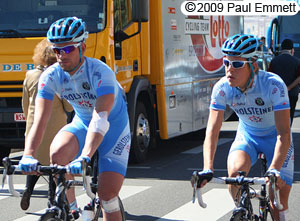Believes many clean riders in peloton but wants to double the fines for the cheaters
 Hans-Michael Holczer ran the Gerolsteiner team until Bernhard Kohl and Stefan Schumacher’s positive doping cases effectively put an end to the dream job of the former teacher. Despite turning away from the sport in disgust, he doesn’t see cycling evaporate from Germany and also thinks there are many clean riders in the peloton. He does wish that the UCI will act firmly in cases like that of Alberto Contador and thinks that doubling the fine – handing out four-year suspensions for first-time offenders – will be enough of a deterrent to further eliminate doping from the sport.
Hans-Michael Holczer ran the Gerolsteiner team until Bernhard Kohl and Stefan Schumacher’s positive doping cases effectively put an end to the dream job of the former teacher. Despite turning away from the sport in disgust, he doesn’t see cycling evaporate from Germany and also thinks there are many clean riders in the peloton. He does wish that the UCI will act firmly in cases like that of Alberto Contador and thinks that doubling the fine – handing out four-year suspensions for first-time offenders – will be enough of a deterrent to further eliminate doping from the sport.
Holczer doesn’t want to see even the loss of the last German ProTour team as dramatic as other. “There will always be cycling,” he told the Kölner Stadt-Anzeiger in an interview. “The fans are there and the sport itself is highly attractive as a do-it-yourself sport.” Holczer did not think that the gap between pro sport and recreational activity could open any further. “I do think cycling has a chance in Germany – I feel that when I speak to people. I think Germany needs cycling, just like any other sport. That many here are annoyed about professional cycling is of course also a fact.”
He mainly thinks that the sport kills itself that way, as it is losing the attractiveness for the sponsors. And in his opinion, the International Cycling Union (UCI) is not stepping up. “The case Contador shows that the International Cycling Union apparently – I say apparently in all cautiousness – tried to cover up this case. They seemed to even have provided help to Contador to put a defense strategy in place.”
Holczer was referring to the UCI telling Contador that it wasn’t a positive test, but an anomaly. “This is far beyond what the UCI should have been doing.” Holczer added that the UCI has one of the most ambitious anti-doping programs from the sports associations. “So the case Contador makes you think a bit.”
Holczer was very disappointed when riders he trusted tested positive and he had an angry exchange with Patrik Sinkewitz at a German talks show a few years ago. But he won’t go as far as Ettore Torri, who said that he suspects all cyclists as dopers. “This is no help to anybody, because that is an injustice to those who – and in my opinion there are a lot more than the continuous discoveries make you believe – do this sport the way it should be, clean.
That is something that is dear to him and he mentioned in his book. “It is not that everybody is doped. I am convinced that there are many professional cyclists who do their job cleanly and who suffer from the surroundings they are in.”
Holczer was not referring to the big names, who are mentioned in the papers all the time. “You don’t find them in the results sheets. They are not the stars. They aren’t the ones who get the most money and they are also not the ones who have t work less – quite the opposite. They may have to work harder than those who manipulate. Only the general suspicion hits them fully.”
Holczer thinks that in many sports manipulation is done but it should be dealt with in a quieter way. “Doping cases are always reported as heavy crimes. A criminal gets a fine and then a re-socialization program. Others who dope won’t get rid of this stigma their entire lifetime.”
One thing that Holczer would like to see is a doping suspension of four years for first timers. “Two years go by quickly, but four years in an athlete’s life is formative – with 30 you are definitely out.”